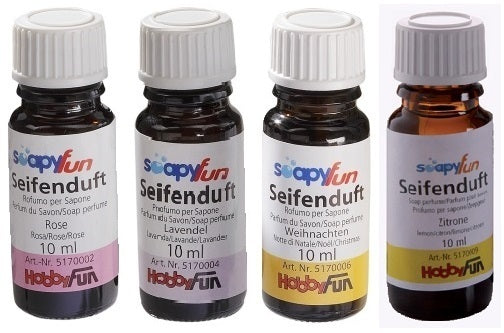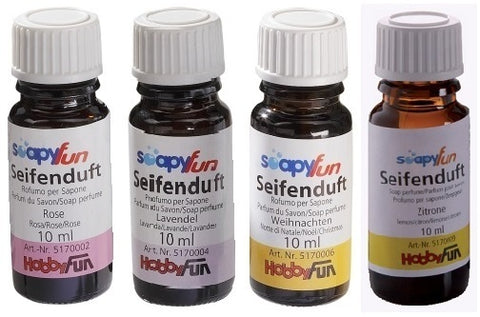The world of soap making is full of different scented oils that can add a unique touch to each and every bar. But which fragrance oil is best for your soap? This question can be challenging, especially if you are new to the world of soap making. In this article we will introduce you to some of the most popular scented oils for soap making and help you choose the right oil for your next soap creation.
Various scented oils can be used in the manufacture of soaps. Popular options include lavender, peppermint, citrus, and rose. It is important to use pure essential oils and avoid synthetic fragrances. The amount of oil depends on the size of the soap batch, but generally 20-30 drops per 500g soap base is recommended. Experiment with different scents to create your perfect soap.

Which fragrance oil for soap making?
1. What is fragrance oil?
Fragrance oils are aromatic oils derived from natural or synthetic sources. They are commonly used in the cosmetics and perfume industries. Fragrance oils are also an important ingredient in soap making. These oils not only give the soap a pleasant scent, but also offer therapeutic benefits.
There are different types of fragrance oils on the market including essential oils and perfume oils. Essential oils are extracted from natural sources such as plants, flowers and fruits. Perfume oils are synthetically produced and often have a longer shelf life than essential oils.
2. Essential oils for soap making
Essential oils have therapeutic properties and can have a relaxing, stimulating, or calming effect, depending on the type of plant used. Some of the most popular essential oils for soap making are:
– Lavender oil: soothing and relaxing
– Peppermint oil: refreshing and invigorating
– Tea tree oil: antibacterial and anti-inflammatory
– Eucalyptus oil: refreshing and invigorating
– Lemon oil: refreshing and uplifting
3. Perfume oils for soap making
Perfume oils are synthetically produced and often have a longer shelf life than essential oils. They come in a variety of scents, offering more choice than essential oils. Some of the most popular perfume oils for soap making are:
– Vanilla: sweet and warm
– Cinnamon: spicy and warm
– Sandalwood: woody and warm
– Rose scent: floral and romantic
– Jasmine: floral and soothing
4. Benefits of Using Fragrance Oils in Soaps
There are many benefits to using fragrance oils in soaps. Here are some of the key benefits:
– Pleasant scent: Scented oils give the soap a pleasant scent that appeals to the senses.
– Therapeutic Properties: Essential oils have therapeutic properties and can have a relaxing, stimulating or calming effect depending on the type of plant used.
- Differentiation from other soaps: Using scented oils can help your soaps stand out from others on the market.
– Mood Enhancement: Some scents can improve mood and help reduce stress and anxiety.
5. Vs of essential oils and perfume oils in soaps
There are pros and cons to using essential oils and perfume oils in soaps. Here are some of the key Vs:
– Naturalness: Essential oils are natural and derived from plants, while perfume oils are synthetically produced.
– Shelf life: Perfume oils often have a longer shelf life than essential oils.
– Price: Essential oils are usually more expensive than perfume oils.
6. How to use fragrance oils in soaps
To use fragrance oils in soaps, you need to add them in the right amount. The recommended amount is about 1 ounce of fragrance oil per pound of soap base. You can also mix different fragrance oils to create a unique fragrance experience.
It is important to add the fragrance oils during the manufacturing process so that they are evenly distributed throughout the soap. You can add the fragrance oils directly into the melted soap base and stir well.
7. Safety measures when handling fragrance oils
When handling fragrance oils, you should always take safety precautions. Some fragrance oils can cause skin irritation, so you should always wear gloves when handling them. You should also make sure the room you are working in is well ventilated to avoid overexposure.
It's also important to read up on the safety information for any fragrance oil you intend to use. Some fragrance oils should be avoided during pregnancy or if you have certain medical conditions.
8. Conclusion
Using scented oils in soaps offers a variety of benefits, including a pleasant scent and therapeutic properties. There are different types of fragrance oils to choose from, including essential oils and perfume oils. Both have pros and cons, and the choice depends on your specific needs.
When handling fragrance oils, it is important to take safety precautions and learn about each oil's safety information. By following these tips, you can safely and successfully incorporate scented oils into your soap making.
frequently asked Questions
Here are some frequently asked questions about using fragrance oils in soap making
Which fragrance oil is best for soap making?
There are many scented oils that are suitable for soap making. The choice depends on personal preference and the type of soap to be made. Some popular options are lavender oil, eucalyptus oil, lemon oil, and peppermint oil. It is important to choose high quality fragrance oils that are specifically formulated for use in soaps for best results.
It's also important to use the fragrance oils according to the manufacturer's directions and to make sure they combine well with the soap's other ingredients. It is advisable to use small amounts of fragrance oil to ensure that the fragrance does not become too strong and that the soap smells pleasant.
Can I use essential oils instead of fragrance oils in soap making?
Yes, essential oils can be used in soap making. They are a natural alternative to synthetic fragrance oils and may offer therapeutic benefits as well. However, it is important to note that essential oils are very strong and must be used in the right amount to avoid irritating the skin or making the soap smell too strong. It's also important to use high-quality essential oils that are specially formulated for use in soaps.
If you plan to use essential oils, you should do your research carefully to make sure you're using the right amount and follow all manufacturer's directions. It's also good practice to use small amounts and adjust the scent as needed.
How much fragrance oil should I use in my soap?
The amount of fragrance oil that should be used in a soap depends on the type of fragrance oil, the type of soap and personal preference. In general, it is recommended to use around 1-2% fragrance oil per pound of soap. This equates to about 0.5-1 ounces of fragrance oil per pound of soap. However, it is important to follow the manufacturer's instructions and adjust the amount accordingly.
It's also important to remember that the scent of the soap will fade over time. So if you want a strong scent, you might want to add a little more fragrance oil. However, it's important to keep track of the amount to make sure the soap doesn't smell too strong or irritate the skin.
How do I store fragrance oils for soap making?
Fragrance oils should be stored in a cool, dark place to maximize their shelf life. It is best to store them in an airtight container to avoid air or moisture getting in and affecting the quality of the fragrance oil. It is also important to keep fragrance oils away from children and pets to ensure safety.
If you are storing fragrance oils for soap making, you should check them regularly to make sure they still smell fresh and have a reasonable shelf life. Using older fragrance oils can affect the quality of your soap and result in an unpleasant smell.
Can I combine different fragrance oils in my soap?
Yes, you can combine different scented oils to create a unique scent for your soap. However, it is important to make sure that the fragrance oils harmonize well with each other and are not too strong. Some popular combinations are lavender and peppermint, citrus and vanilla, and eucalyptus and tea tree.
If you want to combine different scented oils, you should mix and test small amounts first to make sure the scent is pleasant and blends well with the other ingredients in the soap. It's also important to adjust the amount of fragrance oils accordingly to ensure the soap doesn't smell too strong or irritate the skin.

In the world of soap making, finding the right scented oil is important to achieve the desired scent and quality of soap. There are many different types of fragrance oils on the market and it can be difficult to choose the right one for your soap making needs.
It's wise to take your time and try different fragrance oils to see which ones best suit your personal tastes and needs. Some popular scented oils for soap making are lavender, peppermint, eucalyptus, and citrus.
It's also important to make sure the fragrance oil is high quality and doesn't contain any harmful chemicals or synthetic additives that can affect the quality of your soap. By taking the time to find the right scented oil for your soap making, you can ensure you are making a quality and fragrant soap that your customers will love.


